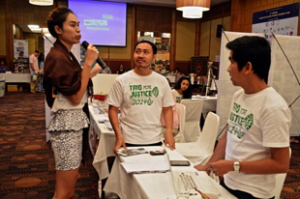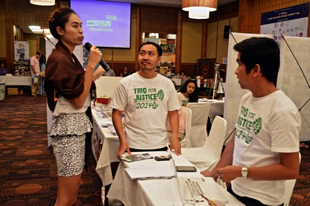As a lecturer at the National University of Laos Faculty of Law and Political Science I am very grateful to have the opportunity of experiencing living in Chiang Mai from October 2013 – January 2014. The accommodation at the BABSEACLE house has allowed me the opportunity to improve my English, learn about different cultures and access to justice issues and share experiences with people from all across the globe. We use English as the common language to communicate with one another. I have also had the chance to use my law knowledge to help a vulnerable group of single mothers at the Wildflower Foundation.
Apart from working with BABSEACLE, I have also attended classes at Chiang Mai University (CMU) as it is my main responsibility here. I learn about two subjects; law and society and law and modern world. These two subjects relate to the theory of law as it is like a philosophy of law. It is very difficult to make sense of a theory, which cannot be proven to be true or false, real or unreal, moral or immoral. Learning and teaching these subjects have made me analyze the purpose of law in society and how the will of law is used as a whole. Is the law served for the people or only for the state authority? This is a huge problem and has been debated by a number of theorists over a long period of time.
My time with BABSEACLE so far has made me realize that my many of the fellow interns do not know much about my country of Lao or why the work of the Faculty of Law and Political Science (FLP) CLE is important. Therefore, I am going to give a brief overview of the history of my country and why CLE is important.
Lao PDR stands for Lao People Democratic Republic, which is located in Southeast Asia. Some might know it as Laos, located in the Indochina Peninsula. However, most people do not know much about Laos as it is a small and land locked country. The population is currently approximately 6.5 million. Laos is also ranked as the least developed country by The United Nations. However, Laos is abundant with a lot of nature including various forests, wild animals, gold minerals and the potential of several of the rivers to build Dams, etc.
Lao people used to live in peace without war. However Laos became one of the colonies of France and during the colonial era  the Indochina War began. With this war, Lao people had to fight for the freedom of the nation, and since 2nd December 1975, Lao has been declared independent as the Lao People Democratic Republic followed by a democratic regime. However, my country is not a military dictatorial country as many people may think as we only have one political party called the Lao people revolution party. The members of the party are from diverse ethnic groups of Lao people. We also have the right to select our representative to work in the National Assembly. The National Assembly will then vote for the President, and the President will select the Prime Minister to be approved by the National assembly members (in accordance with the Constitution, National Assembly law and election law). Before the first Constitution was created in 1991, the Lao people Revolution Party played a very important role in governing their citizen by decrees, regulations, agreements and orders. The country is gradually changing to become a country governed by the State of Law, which is evident through the National Assembly passing more than 90 laws.
the Indochina War began. With this war, Lao people had to fight for the freedom of the nation, and since 2nd December 1975, Lao has been declared independent as the Lao People Democratic Republic followed by a democratic regime. However, my country is not a military dictatorial country as many people may think as we only have one political party called the Lao people revolution party. The members of the party are from diverse ethnic groups of Lao people. We also have the right to select our representative to work in the National Assembly. The National Assembly will then vote for the President, and the President will select the Prime Minister to be approved by the National assembly members (in accordance with the Constitution, National Assembly law and election law). Before the first Constitution was created in 1991, the Lao people Revolution Party played a very important role in governing their citizen by decrees, regulations, agreements and orders. The country is gradually changing to become a country governed by the State of Law, which is evident through the National Assembly passing more than 90 laws.
In my opinion, creating the state of law to reach the demand of society is not an easy task. To not only enforce and to also put these laws into practice will be difficult if many of the people in Lao do not have access to good education. Therefore, I believe that education is a key issue and is the most successful way to build up the state of law.
There is a lack of access to education about the law as many people still live remote areas of the country and they are also very poor. The government wants the people to be governed by a state of law. Therefore teaching the people about their rights and laws is important. This is the kind of work that the FLP CLE does. As a law teacher I am glad to be a part of the education sector as it allows me to teach students about the law and how others should be able to access it.
My work at BABSEACLE has helped further my understanding of the problems that other countries in the Lower Mekong region are facing and how they are similar to those of Laos. I believe that if more people are educated in Laos this will encourage the eradication of poverty in my country.

